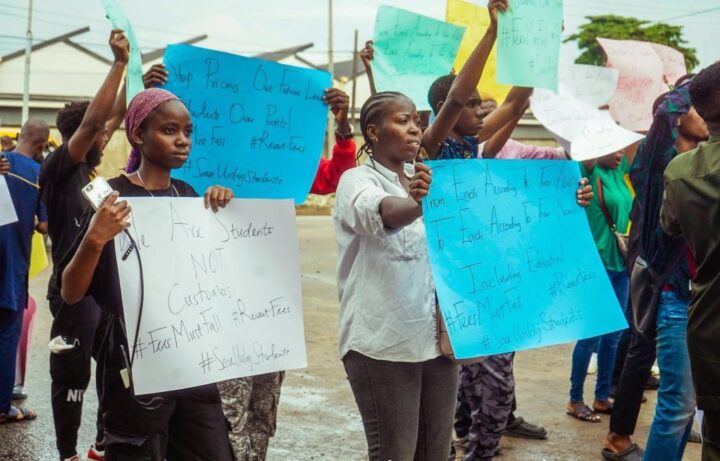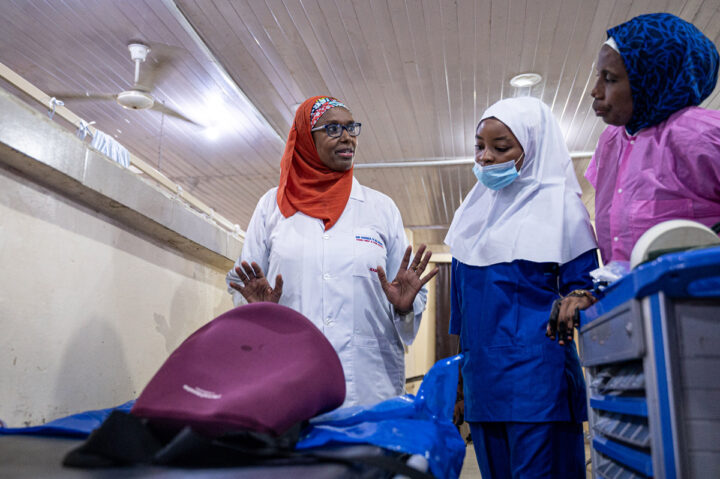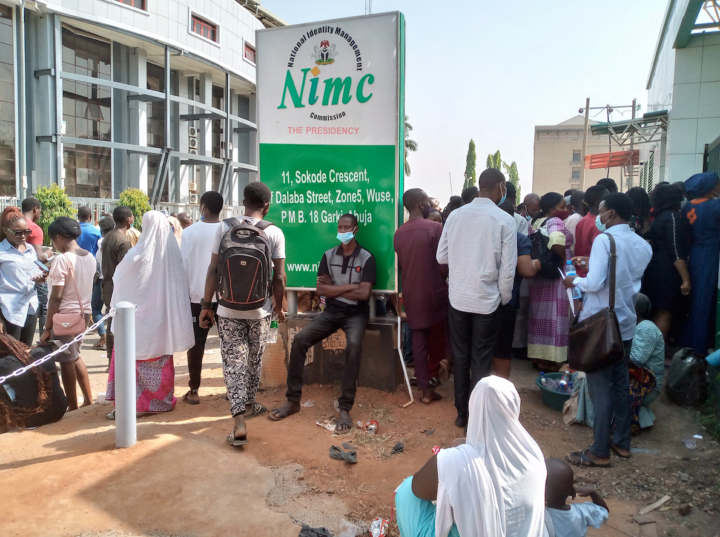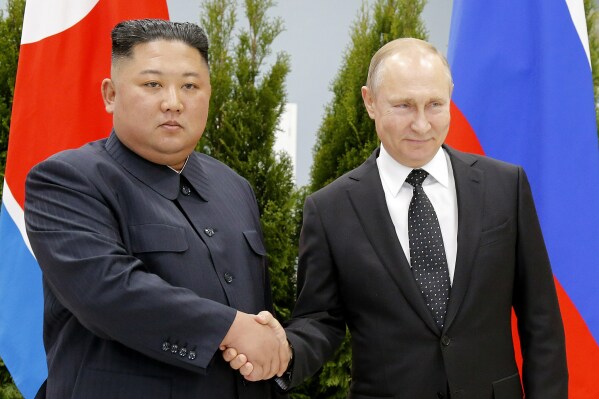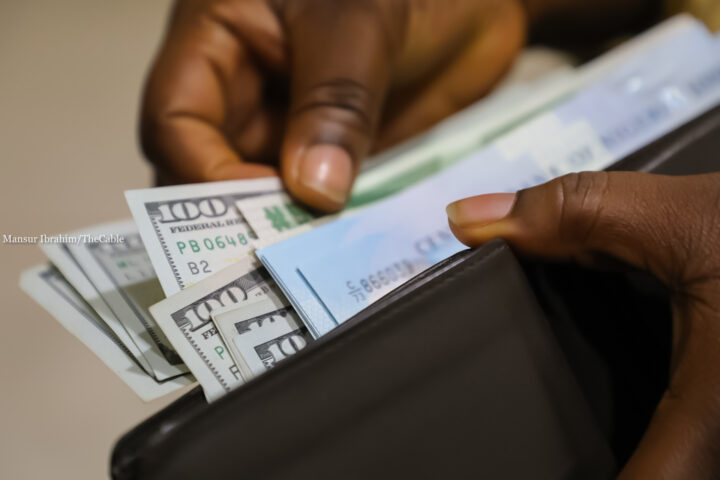Indigent students risk dropping out as rising inflation bites public varsities
Armed police shot a canister into the chanting crowd at the University of Lagos (UNILAG) and everyone took to their heels. What was meant to be another attempt at a campus gate protest quickly ended in a stampede, students coughing, struggling to breathe, and attempting to outrun the peculiar burning sensation that comes with inhaling tear gas.
The crowd started with about 40 people around 8 a.m. on September 6. The students wore placid countenances and held up placards with inscriptions such as “fees must fall”, “education not a privilege”, and “we’re students, not customers”. Policemen, armed with rifles, walked the streets in their numbers and cordoned off the area with vans.
The protesters had their identities questioned, were turned back, and told that the university was not in session, and rightly so. But as the pressure mounted, then came the shots. Nine students were arrested that day. After the dispersal, the protesters would later reconvene to seek the release of their colleagues, then issued a two-day ultimatum within which the varsity was asked to accede to their demands or risk a free-for-all protest in the coming week.
“Since that brutal repression, no university official has come out to condemn the act. Rather, we had our own dean of student affairs, Musa Obalola, openly denying that the protest was carried out by our students,” said Oyelumade Oluwakemi, a 500-level Surveying and Geoinformatics student who lost his voice while partaking in the protest.
Advertisement
In July, UNILAG announced an upward review of its fees and stated that it would take effect from September 1. This put the sessional mandatory charges for new undergraduate students at ₦126,325 for courses not using a laboratory or studio and ₦176,325 per academic session for courses that require the use of a lab or studio.
The sessional mandatory charges for returning students were put at ₦100,750 for courses without labs and studios while that of courses with access to labs and studios were fixed at ₦140,250. The federal university also clarified that the approved charge for all medical students of the institution is ₦190,250. For many returning students, moving from an average fee of ₦21,000 to being asked to pay over ₦190,000 amounted to a one-time hike of over 800%.
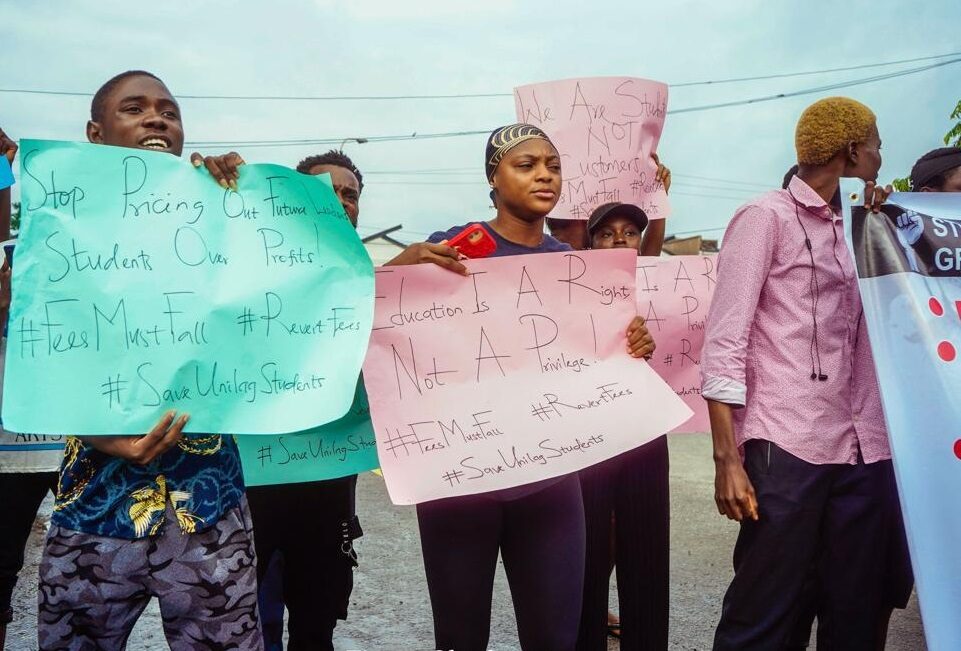
A WAVE OF FEE HIKES IN PUBLIC VARSITIES
Advertisement
Nigeria’s federal universities, which are tuition-free, have been dealing with a sustainability crisis occasioned by the rising costs of living.
In July, Nigeria’s inflation hit a 10-year high of 24.8%, with food inflation rising to 25.25% in the previous month.
Following President Bola Tinubu’s inauguration after the 2023 elections and his successive announcement that fuel subsidy had been discontinued, petrol pump prices surged by around 225%, from ₦210 up to nearly ₦700 per litre.
The resultant increase in transportation costs and power generation expenses caused a further spike in commodity prices that left expenditure for logistics across Nigerian universities at an expected high.
Advertisement
Hence, universities began to raise their fees in a move that some stakeholders argue will defeat the idea of tuition-free and affordable education in federal government-owned tertiary institutions.
Among the federal varsities that have raised their fees over the past months, apart from the University of Lagos, are the University of Maiduguri in Borno, the University of Benin in Edo, Abubakar Tafawa Balewa University in Bauchi, and Usmanu Danfodiyo University in Sokoto. Some of these institutions rolled out the hikes while their students were on break.
Maiduguri was reported to have hiked the fees for their medical students to ₦238,000 in January, up from less than ₦100,000, while that of law students were raised from ₦26,000 to around ₦104,000.
Usman Danfodio’s medical students will now pay ₦109,000 in fees from roughly between ₦60,000 to ₦70,000.
Advertisement
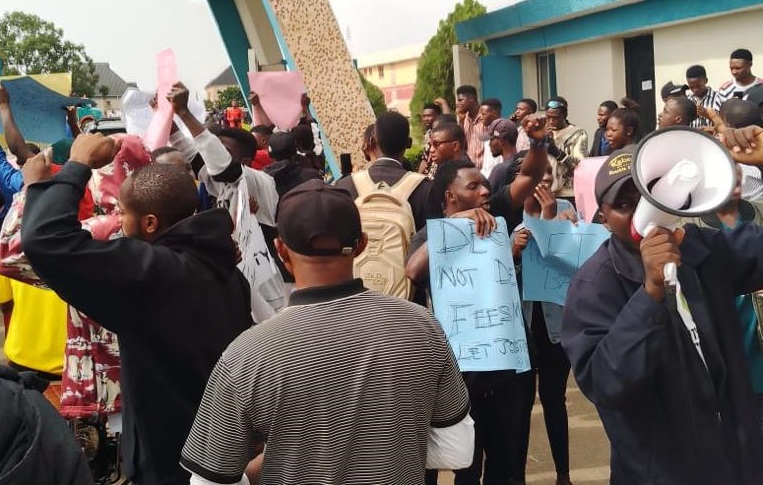
The price schedule for the 2022/2023 session at Bayero University in Kano, a report reveals, showed an increment for students based on their faculties, where law students who were paying ₦39,000 are being billed ₦105,000.
At the University of Benin, the fees were jacked from ₦69,000/₦74,000 range to ₦170,000/₦190,000 after the students had paid less than ₦20,000 per session about five years ago.
Advertisement
A fee hike protest at Ambrose Ali University, a state-owned institution, only resulted in the dissolution of the institution’s student union body.
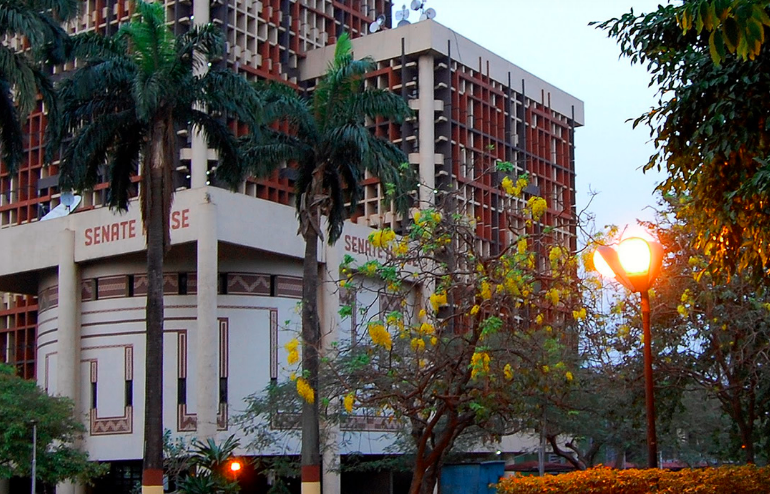
INDIGENT STUDENTS CAN NO LONGER AFFORD SCHOOL
Advertisement
Samson Oni studies Mathematics at the University of Lagos; he was among those in “panic mode” when the federal institution rolled out its new rates. Oni is in his sixth year of an undergraduate programme that should span no more than four years if the pandemic and the disruptive nationwide strike by irate lecturers had not gotten in the way.
To see himself through school, Oni works as a tutor and an education consultant for a monthly pay of ₦20,000, which amounts to $27 at the I&E rate of ₦738 per dollar.
Advertisement
“From that, I feed myself, get a change of clothes, pay hostel rent, and buy materials to read, beyond paying university fees,” he said.
Oni already has his accommodation to worry about, which he said is being considered for a 300% hike, from costing ₦25,000 to close to ₦100,000.
“Making us pay ₦140,000 in fees from ₦21,000, excluding peripheral charges is inconsiderate. Some of my mates sought aid to pay their academic charges even when it was at ₦21,000. How much more now when it has been hiked? Where do I get over ₦400,000 from?” the final-year student sighed, then said he might have to defer his studies.
Oluwakemi, who is running an engineering major course, said the hike will “definitely” fuel a mass dropout of students from their respective degree programmes.
“I have a coursemate who dropped out in year four because they couldn’t afford the old fees. Some were only lucky to get donations,” the student said while lamenting that he had a sessional bill of ₦190,250 to worry about apart from his accommodation and departmental dues that he said have also increased.
Kemi learned of the development when the president for Surveying and Geoinformatics texted his department that they should expect a hike in the new session. He said there was “no dialogue or memo” from the university until July 21 when the increment made it to the press, contrary to the management’s claims that it engaged with relevant stakeholders including unions and student heads.
“Student heads were not consulted. They were only informed,” Kemi exclaimed.
“In all honesty, I come from a poor home. I chose the University of Lagos for its relative affordability. Now, I’m not so sure.”
The National Bureau of Statistics puts the number of Nigeria’s multidimensionally poor people at 133 million. This means the quoted figure is beset with inadequate living standards depriving them of access to quality education.
For these people, a tuition-free federal university system is the only saving grace that puts tertiary education within reach. The public university system, which encompasses both state and federal government-owned tertiary institutions, holds up to an estimated 94% of the undergraduate students in Nigeria.
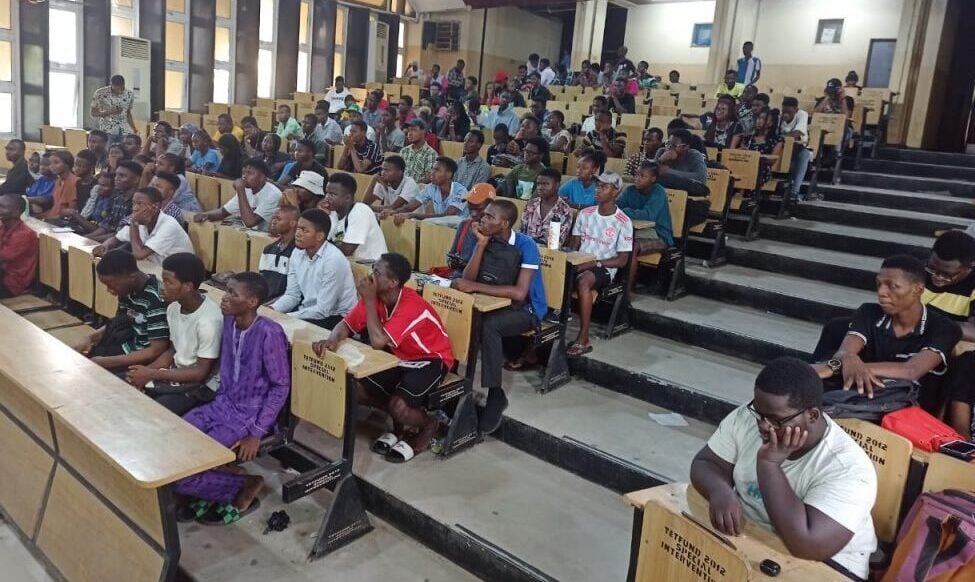
In June, Tinubu ordered the dissolution of the governing councils of all federal universities, meaning that any major decision relating to these institutions might need federal approval as against heading to the councils.
Andrew Adejo, the permanent secretary at the federal ministry of education, told Premium Times that the University of Lagos sought approval to increase its fees, which was exceptionally granted.
He said there was, thereafter, a federal resolution to stop any increase of fees “even though several others had brought their proposals”. Adejo maintained that all federal universities are to remain tuition-free.
On the spate of fee increments across federal tertiary institutions, he said: “What they collect is charges to cover the cost of accommodation, ICT, power, among others.”
VC LAMENTS MOUNTING DEBT, SUSTAINABILITY CRISIS
TheCable contacted the UNILAG vice-chancellor, Folasade Ogunsola, on September 9 for a conversation on the hike. The VC responded by extending an invitation for a briefing.
The VC, at the briefing, laid out what she described as the mounting administrative debt at the University of Lagos.
She said talks of fee increase started in January when it was tabled to the governing council.
“The idea was to look at all our fees and see how we could come to a prevailing rate because we were falling back on our obligations,” Ogunsola said while citing some harsh economic realities. “We had mountains of debt.”
She said the university’s power lines were disconnected in July owing to debt, with another disconnection notice following in August. She said the institution’s electricity bill amounts to ₦1.7 billion annually, with 35,000 undergraduate/postgraduate students and a distance learning centre to run. The VC said that only about ₦876 million in electricity bills is covered by what the university bills the students, leaving a massive deficit.
“The resolve was to give students time between July and October while having more engagement with parents, but things happened. Our council was dissolved and the subsidy was removed which worsened our situation,” she added.
Ogunsola said the University of Lagos spends ₦3,500 to ₦5,000 per student to verify results with exam bodies, a cumulative ₦140 million annually to conduct examinations, ₦62 million in annual programme accreditation payments, and additional logistic expenditure of up to ₦200 million when new courses are introduced.
“By the time we are done, student’s fees don’t cover our electricity bill, and then there are other costs for us,” she said.
Much of government funding for federal universities covers personnel costs. Supplementary sources like TETFUND address gaps in infrastructure and training. Over time, it became the only source of funding available for those activities.
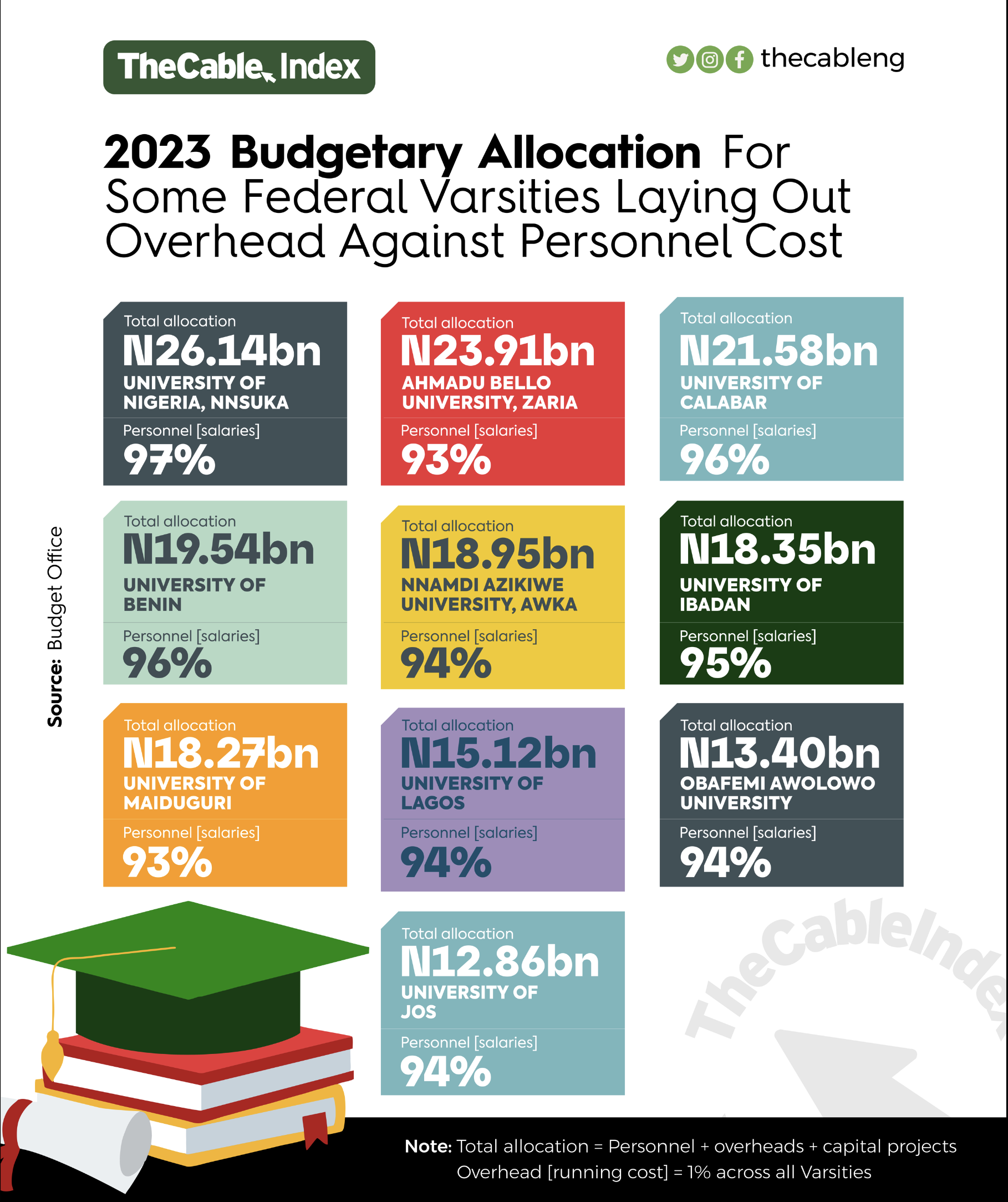
In May, Bolaji Abdullahi, former minister, said state intervention only yields about 44% to 60% of what is required to effectively run a standard university in Nigeria, leaving a deficit of 40% to 56%.
Making an analogy with budgetary allocation for federal universities, he said ₦29.36 billion was allocated to the University of Nigeria Nsukka, but 86.15% of this money ultimately went into covering salaries/personnel costs.
“The federal government covers the salaries but we run the overhead costs which has to come from our student fees,” Folasade Ogunsola added. “In UNILAG, our hostels are ageing. We need major repairs. A lot of our money is sunken on maintenance. Some can be taken on by TETFUND but we spend over ₦500 million annually in everyday cleaning.”
Ogunsola said the University of Lagos gets ₦150 million in budgetary allocation for overhead costs, yet spends far more. “We can no longer cope,” she said. “Everything has gone up but funding for overheads has not changed.”
Nigeria’s public universities have seen repeated disruptions over the years owing to striking lecturers protesting multiple grievances including funding deficits, poor conditions of service, and infrastructural decay.
Academic staff in public universities embarked on their 16th strike in 23 years which lasted for eight months in 2022.
‘WE ARE FACING A TSUNAMI OF STAFF RESIGNATIONS’
Ogunsola said the fee hike at the University of Lagos is coming at a time when Nigeria ushered in a government that saw the need to adopt a cost-reflective orientation towards tertiary education fees.
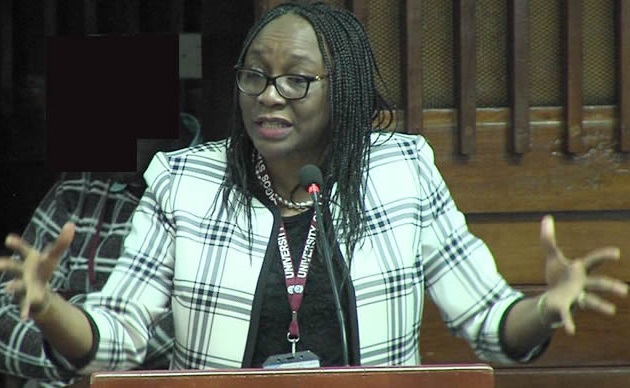
She said many staff members are resigning “in droves” over the university’s declining welfare package, which she argued is the downside of the university’s funding troubles.
“All the while, we held our fee at ₦20,000 per annum, which balls down to about ₦1,500 monthly. The quality of service we can provide has been declining. We used to support our staff to go to conferences so they could improve and give back to students. Those were the things that first disappeared,” the professor said.
“Varsities support their staff so they can get journals. They need to have knowledge. But our staff members feel we don’t take care of them. They are resigning in droves. Over the past week alone, five staffers resigned. It is a tsunami of resignations.
“That the former fee of ₦20,000 maintained for so long was not of our making. It has been difficult to increase it because it was not a part of the former government’s strategy. It is not a new issue that we are being underfunded. It is difficult to compete with other universities on the west coast in Africa.
“Our university is not the best on the ground, but that we have maintained our level has come at a great cost. It is finance and admin funding that comes with the grants our lecturers get that has allowed us to do some things that make it seem as though we are well funded.”
DISTRUST FOR PALLIATIVES, FG STUDENT LOAN
The University of Lagos has an indigent student register which Ogunsola said had 600 students as of 2022, only 200 of which were adopted to various degrees.
There is also the work-study programme that enrolled 112 students who work 10 hours a week on a ₦200 hourly earning but has been upped to ₦500/₦1000. Then, there is the endowment scholarship which the university management said covered 20,000 students. The university said it has also started a drive to seek out more partners and friends that will adopt indigent students and fund their education.
“The students will be evaluated. Some need full coverage, including obligatory and accommodation fees. Others need to sort out only their obligatory fees. We have ratcheted up the amount of support available,” Ogunsola told journalists.
Among the palliatives, she added, is the introduction of instalment payment, where students can spread their bills across a two-semester period in a 50-20-30 percentage system which doesn’t get in the way of balloting for accommodation.
“We took about 8,000 students in the first part of our admission. As of last week, over 5,600 had paid these fees. Quite a large number of returning students have also paid the fees. We already had a fair idea of the percentage of our students who are indigent. And we knew there would be more, with the increased fees,” said the vice-chancellor.
But there is still distrust in these palliative mechanisms, some of which undergraduates at the university say have been in existence and are notably unreliable.
Oni pointed out that the criteria with which a student is adjudged as indigent are not clearly defined.
“Everybody in UNILAG is indigent. If we aren’t, we would have patronised the private universities instead,” he argued.
Kemi re-echoed this sentiment: “The VC pointed out that the measures are for ‘truly indigent’ students. That is a maliciously vague term.”
He said the measures are impractical and performative, soon to leave many students struggling to pay the hiked rates when all the noise dies down.
The federal government created a student loan fund to be serviced by 1% of Nigeria Customs Service (NCS) revenue, Nigeria Immigration Service (NIS), Federal Inland Revenue Service (FIRS), and 1% of oil profits.
To be eligible, a borrower’s family’s income must be below ₦500,000 per year. A civil servant with 12 or more years in service and a lawyer of at least 10 years post-call must also stand as guarantors. But many students think the requirement is a lot.
PROTEST TO CONTINUE AMID VARSITY-STUDENT IMPASSE
Femi Adeyeye, a student in his fifth year, said he is among the undergraduates considering dropping out due to the fee hike at the University of Lagos. For him, leading the protest was not subject to choice.
“If the university is tagged tuition-free and we are paying over ₦215,000, how much will be our bill when the tuition is later added?” Adeyeye asked.
He said the university convened a two-hour meeting on August 2 with a 10-person delegation comprising students.
The student delegates, it is understood, argued that the new rates are “impractical” and decided on without negotiation with students and their parents. The students recommended that a joint committee representing all stakeholders be set up to evaluate the university’s finances and the extent to which there should be an increment.
Adeyeye said a committee of students did a survey and found out that 93% of the students at the University of Lagos will not be able to pay the new rates. He said a percentage of them are also on the verge of dropping out.
“Lecturers could also lose their jobs,” he added. “Imagine if a lecturer teaching 100 students suddenly has to handle only half of that because 50 dropped out. Some of our lectures will be given more courses to handle while others will be laid off.”
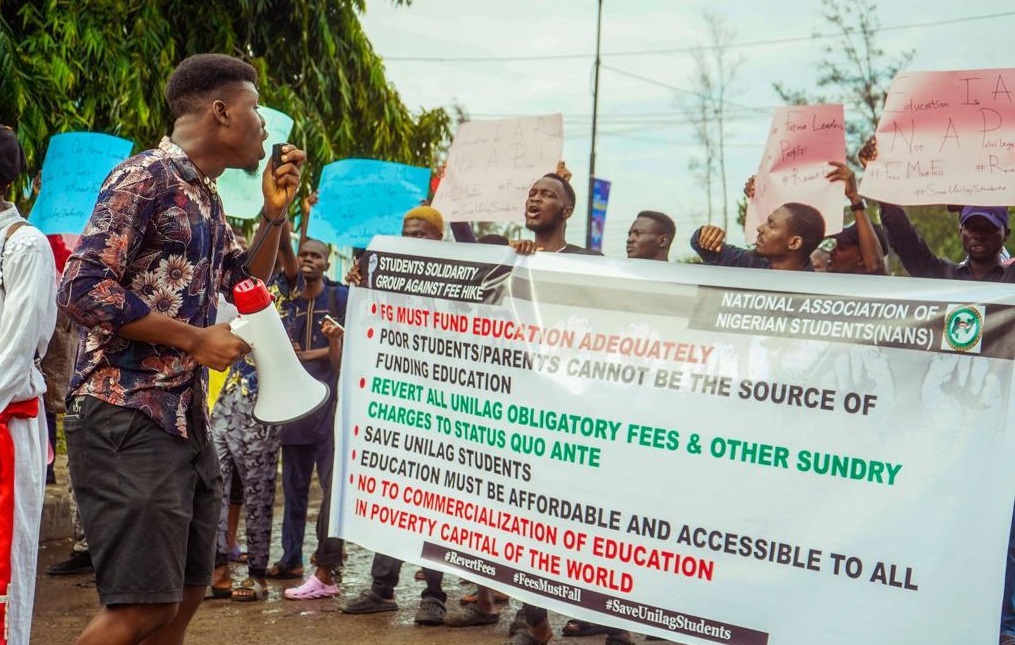
Adeyeye said the management was meant to reach out to the delegation after two weeks of the meeting but did not.
“The university continued to up other fees like accommodation from ₦45,000 to ₦120,000 at the College of Medicine. At the Akoka campus, it is from ₦80,000 to ₦420,000. It was a total disregard to what we agreed on at the meeting,” he said.
Adeyeye was among the nine students arrested during the September 6 protest.
“The police harassed students, beat them up, tear-gassed us. We later found ourselves at the state criminal investigation department in Panti,” he said.
Backed by the National Association of Nigerian Students, the undergraduates are considering a comeback protest for September 13.
“Students are charged up right now because it is either you fight or you drop out of school,” Adeyeye said.
For Ogunsola, as the varsity’s administrator, the decision to raise fees is one that only a federal directive can reverse.
“The poor deserve quality education, but we can’t achieve that with what we were charging before,” the VC insisted at the media briefing.
“We’d have loved to keep the fees where they are but it is about the survival of our university system.”
Add a comment

